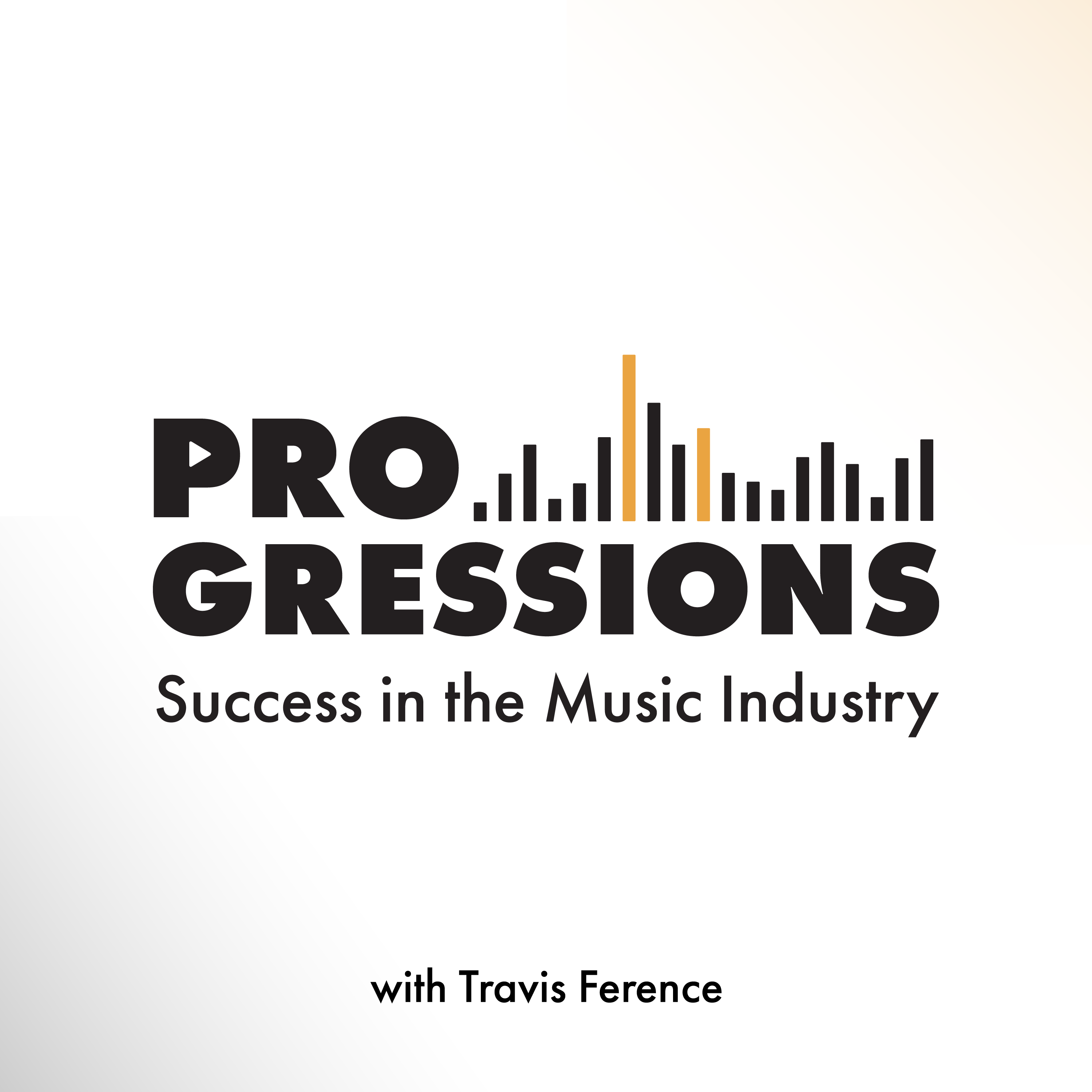What NOT to Do With an Opportunity
Travis reflects on the latest episode’s success on YouTube and how overweighting the follow up to a big win can prevent you from building on that momentum.
In this episode, you'll learn about:
- Why we put so much weight on our next move after a big success or failure
- How overweighting opportunities have been setbacks for his mix career
- How “Quantity” plays into your career growth
- When to transition into the “Quality” phase of your career.
⬇️ FREE 2025 PLANNING WORKSHOP ⬇️
https://www.travisference.com/2025plan
📺 WATCH THE SHOW ON YOUTUBE 📺
https://www.youtube.com/@progressionspod
Connect with Me:
📬 Newsletter: https://www.travisference.com/subscribe
📸 Instagram: https://www.instagram.com/progressionspod
🎵TikTok: https://tiktok.com/@progressionspod
🐦 Twitter: https://twitter.com/progressionspod
🌐 Website: https://www.travisference.com/
🙏 Leave a Review or Rating 🙏
Apple: https://www.progressionspodcast.com/apple
Spotify: https://www.progressionspodcast.com/spotify
📢 Our Sponsors 📢
Listen to Secret Sonics!
Sign Up for Complete Producer Network!
Credits:
Guest: N/A
Host: Travis Ference
Editor: Travis Ference
Theme Music: inter.ference
Transcript
Hey, welcome to progression success in the music industry. You know, when you hear that
Speaker:these days that we're going unscripted, I thought that might be
Speaker:fun. I've enjoyed the unscripted stuff that I've been doing
Speaker:lately on the audio podcast, and, you
Speaker:know, thinking about the YouTube and how the production value
Speaker:there keeps going up and how those videos become
Speaker:solo podcast episodes, I feel like maybe there's space to
Speaker:just be really. I don't want to say honest and truthful, because I am
Speaker:honest and truthful, but, you know, unscripted and off the cuff. In the spirit
Speaker:of that, I am having a cocktail right now. It's an old
Speaker:fashioned. I'm kind of a weirdo. I mean, any engineer
Speaker:you would imagine might be compelled to
Speaker:weigh their cocktails. And so that's what I do. I use a. I use
Speaker:a dry scale. Uh, but 1.8oz of
Speaker:bourbon or rye, 0.3oz of maraschino cherry
Speaker:liqueur. That's my sweetener. Instead of a simple syrup, I
Speaker:do two dashes of regular bitters and two dashes of orange bitters. And I use
Speaker:a lemon peel, not an orange peel. So, now you know what's
Speaker:going on with my evening, but let's talk about what's going
Speaker:on with the podcast. So, this week, or I guess it's last week at this
Speaker:point, mastering is dead. I mean, it's obviously not dead. If you listen to the
Speaker:episode, then you know that it was very pro mastering. Uh, it was just
Speaker:packaged in a YouTube style, and that video
Speaker:did really well. I'm actually. I'm really excited
Speaker:about how well it did. Uh, it's really grown
Speaker:the progressions YouTube a lot, which is another reason that I think you. You know,
Speaker:I want the audio podcast to retain some of the audio podcast character.
Speaker:I don't want to script everything on here. But while thinking about how to
Speaker:follow that video up, well, a. I felt the
Speaker:pressure, right? It has 11,000 views. I've gotten, like,
Speaker:almost 500 subscribers from it. And when.
Speaker:When you get a big win, I mean, that's not a huge win, but you
Speaker:get a win like that, you really second guess how you want to follow that
Speaker:up. Do I do an interview? Do I do another solo video?
Speaker:How much time do I have this week? And I just. I decided
Speaker:I'm not comfortable just pushing something out to YouTube this
Speaker:week that would also obviously be an audio podcast
Speaker:that, you know, just fits into the amount of time that I have this week,
Speaker:which is not. Not a lot. So I thought, let's talk
Speaker:about following up on a big win or a
Speaker:big loss, because I think that's really what separates
Speaker:people from being super successful. And
Speaker:not if you're the type of person that is not afraid to
Speaker:just keep moving forward after a success
Speaker:or not afraid to keep moving forward after a failure.
Speaker:I think you're going to find yourself really way out in front of
Speaker:the pack. It doesn't sound difficult, but if you've
Speaker:maybe written a song that has done well
Speaker:or worked on a record that's done well, or put a
Speaker:YouTube video out that's done well, when you go to do that same
Speaker:thing next time, you remember that
Speaker:you did so well last time. And it's kind of, you know, it reminds me
Speaker:of golfing. I used to golf when I had time every weekend
Speaker:or every other weekend, and you're always doing battle with yourself.
Speaker:You're always comparing your current score with your
Speaker:score. Last time, my scores were horrible, but
Speaker:whenever I had a good one, if I went out and actually played
Speaker:respectable golf, still bad the following week, I would. It
Speaker:would be like a 120. I'd be like, I'd want to, like, walk off the
Speaker:course because there's all that pressure to follow that up. And I definitely
Speaker:think that that obviously applies to any
Speaker:creative or business endeavor. And I think mastering, not
Speaker:having that fear of follow up, which is almost like
Speaker:it's as much a fear of failure as it is a fear
Speaker:of success, because obviously, you don't want
Speaker:to have a failure after a big win, but then you
Speaker:also have this momentum, and if you get another big
Speaker:win, are you going to, like, propel yourself further ahead than you
Speaker:never expected and not realize what the next step is? And it
Speaker:sounds weird to say fear of success, but
Speaker:I do believe that there are people that hold themselves back
Speaker:because they're afraid of the change. Think of how many artists
Speaker:that you might know that have had massive success
Speaker:out of nowhere and then not followed it up
Speaker:or waited forever to follow it up because there's a lot of weight there.
Speaker:I think a good example is I think that my
Speaker:worst mixes are the ones that I am
Speaker:most concerned about following through on because they're an amazing
Speaker:opportunity. I will overthink those mixes,
Speaker:almost run them into the ground. In fact, I can think of two mixes where
Speaker:they didn't use my mix because I probably didn't trust
Speaker:my gut and trust my instinct, and I over thought it because it was
Speaker:a bigger artist than I normally work with. It was a good opportunity. It was
Speaker:a big producer, whatever it is I put too much weight on
Speaker:that opportunity. And I think that's really what it is, is
Speaker:when you're following up a win, a lot of us put too much weight
Speaker:on that opportunity, and so it can be really easy to let
Speaker:yourself down. That's what people are afraid of. They don't want to
Speaker:come from that. That high and then transition into being let
Speaker:down. And, you know, this is coming from the guy that is not doing
Speaker:a YouTube video this week. Instead, I'm going rambling unscripted
Speaker:with a cocktail on my podcast. But
Speaker:I don't think that it's because I'm afraid of failure
Speaker:or afraid of success. I believe that it's because I
Speaker:don't have the bandwidth this week to
Speaker:approach this opportunity with the right strategy. And I
Speaker:think that is the angle that you
Speaker:should be taking. If you put a song out and it's doing really well,
Speaker:take a moment to think about why is this song doing really
Speaker:well? What part of what I did
Speaker:worked? Was it your marketing? Was it outreach
Speaker:to people? Was it organic? Was it just that? It was a great song
Speaker:and it worked. Look at that and think about that before you roll
Speaker:your next song out. Because if there's something that you can take away and apply
Speaker:it to the strategy for your next one, then you're going to set yourself up
Speaker:for. For potentially compounding that opportunity.
Speaker:So to kind of step away from that angle for a
Speaker:moment, I think there is also something else that comes into play here
Speaker:where the state of the world and the short
Speaker:attention span ness of culture these days, I think
Speaker:encourages you to follow up any
Speaker:opportunity or missed opportunity with
Speaker:quantity. This is a horrible example for musicians, but let's just say you want
Speaker:to be like a influencer, right? Where you put a video out on
Speaker:TikTok and it doesn't get any plays. So you put another one out. You put
Speaker:another one out, you put another one out, you immediately want to follow it with
Speaker:more, more, and you're not worried about whether it's better or
Speaker:worse. Maybe you are, but you're just pushing forward with more
Speaker:quantity. Or in the complete opposite situation, you
Speaker:put a video out and it blows up and it goes viral and you do
Speaker:the same thing. You just do more and more, more, more, more, more. And I
Speaker:think that that's helpful. When you're starting out at something like, if you're
Speaker:just starting to release music or you're just starting to mix records, the
Speaker:reps are huge. You need the reps. You need to put
Speaker:out more, write more songs, release more songs and you get
Speaker:comfortable in that whole process. But I
Speaker:think eventually, whether you are as successful as you'd
Speaker:like to be or not, quality has to come into play.
Speaker:And I think that's where a lot of people might go wrong. And
Speaker:now I am. I am truly off script with no bullet points. So
Speaker:hopefully, when this is over, it still makes sense. But I think if you
Speaker:are on the quantity road and you're putting the reps in and you're
Speaker:reaching a level of success and you don't transition
Speaker:into quality, then you're missing an
Speaker:opportunity. Because if you've done the work, you've put the reps
Speaker:out, you've released the music, you've written the songs, you've mixed, what, whatever it
Speaker:is, once you've put the reps in and you're actually good at that thing,
Speaker:if you continue with the quantity mindset, I think that you're going to
Speaker:plateau yourself and that you're going to be at a ceiling. And I
Speaker:guess the ultimate would be to have quantity and quality. But in order to do
Speaker:that, I think you need to do the quantity game until you're good at it,
Speaker:then do the quality game, figure out how to do the best thing that you
Speaker:can do and then put them together. Now that I say it out loud, that
Speaker:is the end goal. And that is how you get there. Even if you're not
Speaker:making music or making content or whatever it is, even if you're just engineering or
Speaker:just mixing or just mastering, that's what your idols did. They did a lot of
Speaker:work until they built their skillset. Then they really honed
Speaker:and mastered their skill, and now they're able
Speaker:to do a large quantity of great work. Yeah. So I think
Speaker:that's where we're going to leave this one, I guess, to do a quick summary.
Speaker:The takeaways here are to really believe in
Speaker:your follow up. Whether it's from a win or from
Speaker:a loss, that next opportunity that comes,
Speaker:remember that you are going to overweight that opportunity
Speaker:and don't let that prevent you from putting your best foot forward.
Speaker:I guess to tie the second half to the first half of this little
Speaker:rant, it's important to know where you are in your
Speaker:career. Know whether you're in the reps skill
Speaker:building phase, or if you're in the focus on quality
Speaker:phase, or if you're transitioning into that combo
Speaker:of the two that hopefully you'll spend the back half of your
Speaker:career in. And I think if you're aware of where you are in your
Speaker:journey and you can tie that to your wins
Speaker:and losses and use that to trigger some confidence in your follow
Speaker:up. I think you're going to be in a great place so I hope this
Speaker:one was helpful. I appreciate all my longtime
Speaker:audio listeners and let me know whether these unscripted things
Speaker:are working for you. I'm enjoying them. I'm getting better out of my
Speaker:hope. And also remember there's a new website progressionspodcast.com
Speaker:dot. You can leave me a voicemail. At least one of you
Speaker:please go to that website and leave me a voicemail and just tell me whether
Speaker:I should do more of these, whether this was helpful. And yeah,
Speaker:I look forward to hearing that person's voice or two or three or four
Speaker:of you. So I'll see you all next week. Don't forget to subscribe to the
Speaker:YouTube, sign up for the newsletter and I appreciate each
Speaker:and every one of you for sharing the show and telling people about it.


